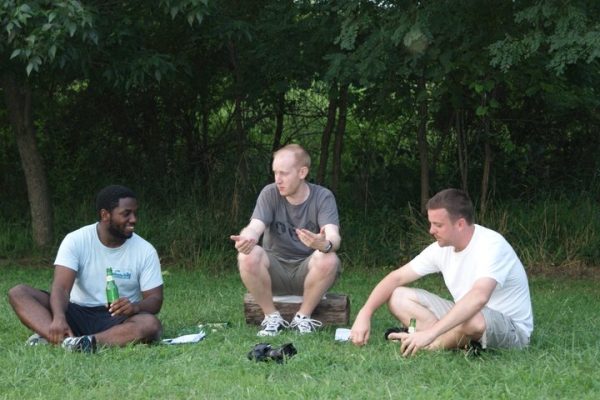Hard Core (Values): Collaboration

Pictured: Chinaza Uche, Will Lowry and Matt Archambault at the 2011 Flux Retreat, undoubtedly collaborating on something important. Post by August Schulenburg.
Collaboration: Our process is inclusive, transparent, and sustained through long term partnerships.
As you’ve no doubt noticed, we’ve returned to posting on FluxBlog more regularly after an unfortunate slumber. I’m interested in trying out a series that focuses on the wider frame of our Mission, Core and Aesthetic Values. In this case, a couple of things reminded me of our Core Value of Collaboration.
First up is this post from the New York Innovative Theatre Awards about the BFG Collective. Nick Micozzi interviews our Heather Cohn, Gideon’s Mac Rogers and Boomerang’s Tim Errickson to talk about the genesis of our six month collective at The Secret Theatre in Long Island City. It’s a great look at the different ways we’re finding to collaborate, and the unique structure of the collective:
“We’ve arranged it so that the three companies collaborate at the macro level of administration and sharing resources, but we still allow each company its own particular operational culture. This is vital,” Rogers continued, “because Boomerang, Flux, and Gideon work in very different ways.”
This came on the heels of this post from Jim Hightower I discovered on the Daily Kos, which has this money quote in describing the value of cooperatives in opposition to the traditional corporate structure:
“Cooperatives can (and do) provide a deeply democratic, locally controlled, highly productive, efficient percolate up capitalism.”
This sounds an awful lot like the fiendishly efficient, artist driven, community engaged being created by Indie Theatres locally and Ensemble Theatres on a national level.
What surprised me was what followed next in Hightower’s post – the amount of businesses functioning as cooperatives:
“…there are 30,000 cooperatives in America (with 73,000 places of business). A 2009 survey by the University of Wisconsin’s Center for Cooperatives (www.uwcc.wisc.edu) found that these energetic enterprises have 130 million members, registering $653 billion in sales and employing more than 2 million people.”
While this may seem small given the size of the entire American economy, it is not insignificant, and it presents a welcome alternative to the adversarial corporation-vs-union dynamic currently playing out.
How can we find other opportunities for cooperative, collective behavior like BFG?
How can theatres working in some version of the cooperative model align ourselves with the larger cooperative movement?
Food for more (collaborative) thought.




Recent Comments